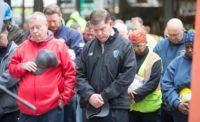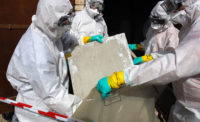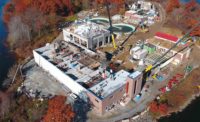As Boston's deadline to batten down the hatches at construction sites inched closer, city official expected full compliance with an order issued March 16 by Mayor Martin J. Walsh (D) to halt construction in the city aimed at preventing coronavirus from spreading. It gave contractors and owners until March 23 to secure projects and install skeleton crews to keep sites safe for the remainder of the suspension.
"We expect all sites that fall under our guidance to comply," Lisa Timberlake, a spokeswoman for the city's Inspectional Services Dept., told ENR on March 23.
[For ENR’s latest coverage of the impacts of the COVID-19 pandemic, click here]
The first construction ban by a major city in the wake of the COVID-19 outbreak impacts approximately 97 projects, according to the Boston Planning and Development Agency.
Gilbane Building Co. shuttered 14 projects in Boston. Work to shut down the sites started "immediately following the mayor’s announcement" and went "smoothly" after that, according to Mike O’Brien, a vice president and the Massachusetts business unit leader at the Providence, R.I.-based firm. O'Brien said "systematically" suspending and securing operations involved developing a "project closure checklist that ensures thorough and complete demobilizations of our sites, including project operations, safety and security, risk and supply chain management."
O'Brien says Gilbane supports the mayor's decision to close construction sites, in part, because it's harder to maintain social distancing on projects with "smaller footprints with more density of tradespeople." The firm relocated workers from its Boston jobs to "sites outside Boston" that "are generally large, open-air sites with plenty of acreage that supports the social distancing protocol," O'Brien said. "We will remain nimble and will, of course, conform to any new mandates on the state level."
Projects owned by the Massachusetts Port Authority such as the expansion of Terminal E at Logan International Airport are exempt from Boston's order. So are essential projects such as emergency utility work, road and building work, such as gas leaks, water leaks and sinkholes. Other exemptions include: New utility connections to occupied buildings, mandated building or utility work, work at public health facilities, healthcare facilities, shelters, including temporary shelters and other facilities that support vulnerable populations, work which ensures the reliability of the transportation network and other work necessary to make occupied residential buildings fully habitable.
A press release announcing the order also notes that "on a case-by-case basis" the city will "review requests for exceptions to the temporary construction moratorium" that have to be granted by Inspectional Services Dept.'s commissioner for building-related work or the commissioner of the Public Works Dept. for street-related work. "These will be granted if they support increased public health and safety," the press release notes.
Walsh said he would revisit the order two weeks after he issued it on March 16.
Following Boston's lead, Cambridge, Mass. and Pennsylvania issued their own construction moratoriums, although Pennsylvania is exempting hospital projects.
Massachusetts' Gov. Charlie Baker (R) has said he is not planning to issue a statewide construction ban.
Baker's March 23 order to close all "non-essential" businesses and organizations for two weeks specifically excludes construction workers. Construction continues to operate with COVID-19 regulations in cities such as Somerville, Medford and Quincy. The MBTA's $2.3-billion Green Line Extension project also continues.






Post a comment to this article
Report Abusive Comment